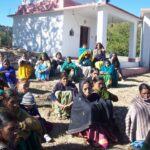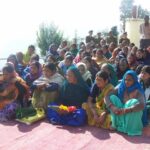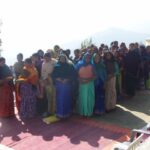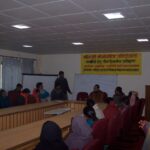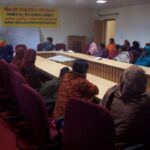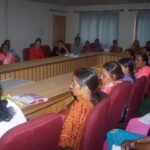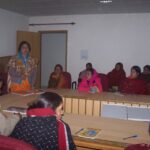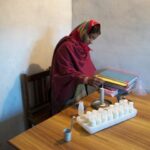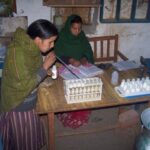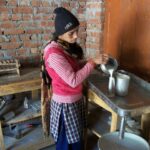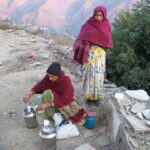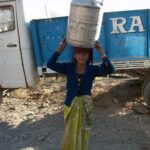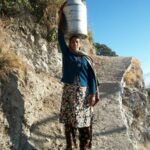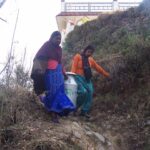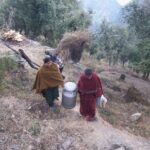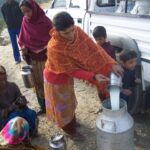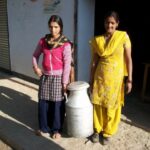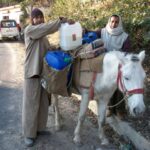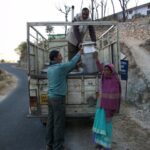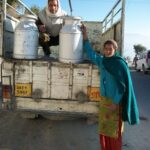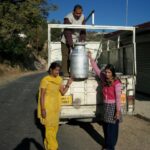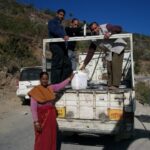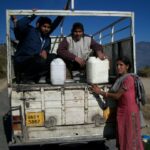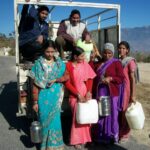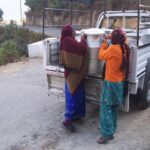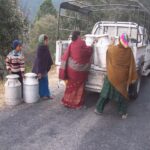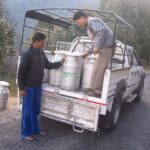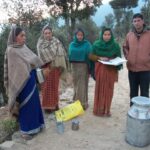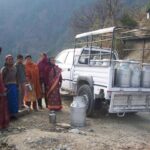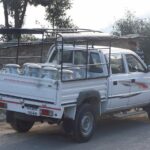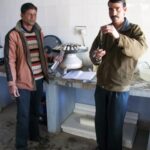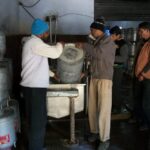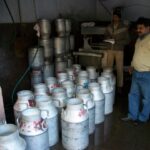WOMEN DAIRY DEVELOPMENT PROJECT
WOMEN DAIRY DEVELOPMENT PROJECT UNDER SCHEME OF SUPPORT TO TRAINING AND EMPLOYMENT PROGRAM FOR WOMEN (STEP) IN DISTRICT TEHRI GARHWAL OF UTTARAKHAND
INTRODUCTION AND BACKGROUND OF THE PROJECT
The Women Dairy Development Project stands as a transformative initiative designed to empower the rural women residing in the Tehri Garhwal district of Uttarakhand, India. With the visionary backing of the organization and the invaluable support of the Ministry of Women & Child Development, Government of India, under the esteemed Scheme of Support to Training and Employment Program for Women (STEP), this project is strategically crafted to cultivate dairy farming as a sustainable livelihood avenue. The paramount objective driving this endeavour is to furnish women with the essential competencies and resources that empower them to partake in dairy farming autonomously. By doing so, it aims to not only cultivate financial autonomy but also contribute to the economic prosperity of their families. Tehri Garhwal, renowned for its agricultural landscape, is confronted with the challenge of restricted women’s access to resources, education, and training. This bottleneck curtails their participation in income-generating undertakings. In response, the Women Dairy Development Project emerges as a beacon of change, charting a course to impart comprehensive training encompassing diverse aspects of dairy farming. This encompasses animal husbandry, breeding, milk production, marketing strategies, and adept financial management.
At its core, the project emphasizes the creation of women’s self-help groups, fostering an environment of camaraderie and the exchange of knowledge amongst female farmers. Further enriching this ecosystem, Women Dairy Cooperative Societies (WDCSs) will be established, thoughtfully equipped with the requisite training, technical reinforcement, and state-of-the-art milk-processing equipment. The implementation blueprint of the project is intricately woven with a commitment to extend technical guidance to women farmers, augmenting their productivity and capacity for income generation. A transformational stride towards dismantling gender inequalities and fostering female empowerment in rural landscapes, the Women Dairy Development Project bears the potential to be a game-changer. Beyond its profound impact on individual women, it also holds the promise of significantly propelling the socio-economic evolution of the Tehri Garhwal district.
AIMS AND OBJECTIVES OF THE PROJECT
1. Administer comprehensive training sessions to women beneficiaries, spanning both family and cluster levels, within dairy development programs, thus augmenting their knowledge and skill set across various facets of dairy farming.
2. Facilitate the organization of women beneficiaries into cooperative societies, thereby establishing economically viable platforms that facilitate dairy farming. This approach enables these women to access credit and financial resources, vital for supporting their dairy-related initiatives.
3. Amplify women’s income and employment prospects by actively engaging them in dairy development programs, effectively fostering an environment that encourages self-employment and entrepreneurial activities within the dairy sector.
4. Furnish women beneficiaries with technical support packages, effectively guiding them in the implementation of enhanced animal husbandry practices while concurrently elevating the quality and productivity of dairy products.
5. Empower women hailing from economically disadvantaged backgrounds, inclusive of Scheduled Castes, Scheduled Tribes, Other Backward Classes, and Below Poverty Line families, through active engagement that facilitates their participation in the local economy and decision-making processes.
6. Nurture grassroots leadership among women beneficiaries, thereby enabling their transition into leadership roles within the dairy farming sector. This contribution significantly bolsters the overall sustainability of project objectives.
COMPONENTS AND ACTIVITIES OF THE PROJECT
1. Deliver comprehensive training sessions, technical skill development, and thorough orientation to women beneficiaries participating in the dairy development program, significantly enhancing their proficiency in various aspects of dairy farming. This encompasses animal husbandry, milk production, and the processing of dairy products.
2. Establish strategic collaborations with agricultural universities, ICAR institutions, and training organizations, thereby facilitating the provision of technical assistance and expert consultancy. This collaborative effort ensures the project’s success through guided expertise.
3. Develop indispensable program infrastructure, which encompasses pivotal elements such as marketing support, stringent quality control measures, and managerial assistance. This includes provisions for artificial insemination services and financial aid intended to facilitate cattle procurement by women beneficiaries.
4. Forge the creation and subsequent reinforcement of Women Dairy Cooperative Societies (WDCS) and field-level setups, establishing a robust foundation for efficient operations. These setups promote crucial backward and forward linkages, ultimately guaranteeing women’s access to essential inputs, resources, and lucrative markets.
5. Extend unwavering marketing support to both milk cooperatives and individual milk producers, effectively fostering market linkages and thereby advancing the promotion of dairy product marketing.
6. Provide an extensive range of support services, including health check-up camps, enlightening sessions on health, hygiene, nutrition, as well as various educational programs such as legal literacy camps, gender sensitization, HIV/AIDS awareness, among others.
7. Empower women beneficiaries through the multifaceted dairy development program, thus propelling economic growth, fostering self-sufficiency, and cultivating active involvement in crucial decision-making processes.
TARGET AREA OF THE PROJECT
The project was executed within the Chamba block of the Tehri Garhwal district in Uttarakhand. While the area held substantial promise for dairy farming, it concurrently confronted various challenges.
TARGET GROUPS AND BENEFICIARIES OF THE PROJECT
The project’s exclusive focus rested on women, with a particular emphasis on those hailing from economically disadvantaged backgrounds, including Scheduled Castes (SC), Scheduled Tribes (ST), Other Backward Classes (OBC), and families falling below the poverty line (BPL), receiving prioritized attention.
FUNDING PARTNER OF THE PROJECT
The project received funding from the Ministry of Women & Child Development (MWCD), Government of India, New Delhi, under the Support to Training and Employment Program for Women (STEP) scheme.
SANCTIONED BUDGET OF THE PROJECT
The Ministry sanctioned the project in 2007 through a sanction order (No. F. No. 27-5/2004-STEP dated 15.05.2007), with a total budget of Rs. 72,51,775.00 for a duration of three years. The Ministry provided Rs. 65,26,598.00, while HIFEED contributed Rs. 7,25,177.00.
OUTCOMES AND ACHIEVEMENTS OF THE PROJECT
The successful implementation of the Women Dairy Development Project has resulted in the establishment of the following outcomes and achievements:
1. Women beneficiaries have received training at family and cluster levels, as well as technical back-up packages to improve dairy development programs and animal husbandry practices.
2. Women have been organized into cooperative societies, which have become economically viable facilities, providing access to credit and backward and forward linkages.
3. Course material, literature, and other resources have been developed to support the training of beneficiaries, while technical assistance and consultancy have been provided by agricultural university/ICAR institutions/training institutions, among others.
4. Women Dairy Cooperatives Societies (WDCS) have been established, mobilized, and strengthened at the field level, with marketing support provided to the milk cooperatives and milk producers.
5. Artificial insemination services have been provided to improve the breed of the available livestock, which has resulted in improving the quality of the milk produced.
6. Women from economically weaker sections, SC, ST, OBC, and BPL families have actively participated in their village economy, moving into positions of decision-making power, while grassroots level leadership among women has been developed to ensure the sustainability of project objectives.
7. The project has provided marginal money to women beneficiaries to purchase cattle, while also providing holistic support, promoting their empowerment and economic development.
8. Women’s participation in dairy development programs has increased income and employment generation opportunities for them, while support services such as health check-up camps, awareness camps on health, hygiene, and nutrition, and non-formal education programs have been provided to women beneficiaries.
9. Crèche facilities have been made available during training programs, legal literacy camps, gender sensitization and gender awareness programs, population and development education, training on local self-governance, programs on human rights, child rights, HIV/AIDS awareness, immunization programs for pregnant mothers and children, awareness about government programs, right to information, awareness on consumer protection, and more have been provided to women beneficiaries.
10. The project has provided comprehensive assistance, including technical, financial, and educational support to women beneficiaries, contributing to their social and economic development.


